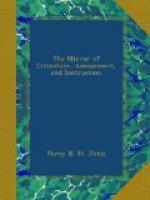W.A.R.
P.S. This is a sleepy article; and I would warn its reader to endeavour not to fall asleep over it, and thus endanger his falling over his chair; and lest some familiar friend or chere amie should, finding his instructions in his hand, take the opportunity of making the experiment, and may be create a little jealous quarrel or so.
* * * * *
SONNET TO THE RIVER ARUN.
(For the Mirror.)
Pure Stream! whose waters gently glide
along,
In murmuring cadence to the Poet’s
ear,
Who, stretch’d at ease your flowery
banks among,
Views with delight your glassy surface
clear,
Roll pleasing on through Otways sainted
wood;
Where “musing Pity” still
delights to mourn,
And kiss the spot where oft her votary
stood,
Or hang fresh cypress o’er his weeping
urn;—
Here, too, retir’d from Folly’s
scenes afar,
His powerful shell first studious Collins
strung;
Whilst Fancy, seated in her rainbow car,
Round him her flowers Parnassian wildly
flung.
Stream of the Bards! oft Hayley linger’d
here;
And Charlotte Smith[1] hath grac’d
thy current with a tear.
The Author of “A Tradesman’s Lays.” No. 85, Leather Lane.
[1] This charming, accomplished
poetess has addressed one of her
most
beautiful “Elegiac Sonnets” to this inspiring
River.
Her
tender image of the “infant Otway” is,
however, borrowed
from
a stanza in Collins’s inimitable “Ode to
Pity:”—
“Wild
Arun, too, has heard thy strains
And
echo ’midst my native plains
Been
sooth’d by Pity’s lute;
There
first the wren thy myrtles shed
On
gentlest Otway’s infant head—
To
him thy cell was shown,” &c.
* * * * *
RETROSPECTIVE GLEANINGS.
* * * * *
ANCIENT BLACK BOOKS, &c.
(For the Mirror.)
The Black Book of the Exchequer is said to have been composed in the year 1175, by Gervase of Tilbury, nephew of King Henry the Second. It contains a description of the court of England, as it then stood, its officers, their ranks, privileges, wages, perquisites, powers, and jurisdictions; and the revenues of the crown, both in money, grain, and cattle. Here we find, that for one shilling, as much bread might be bought as would serve a hundred men a whole day; and the price for a fat bullock was only twelve shillings, and a sheep four, &c. At the end of this book are the Annals of William of Worcester, which contain notes on the affairs of his own times.
The Black Book of the English Monasteries was a detail of the scandalous enormities practised in religious houses: compiled by order of the visiters, under King Henry the Eighth, to blacken them, and thus hasten their dissolution.




